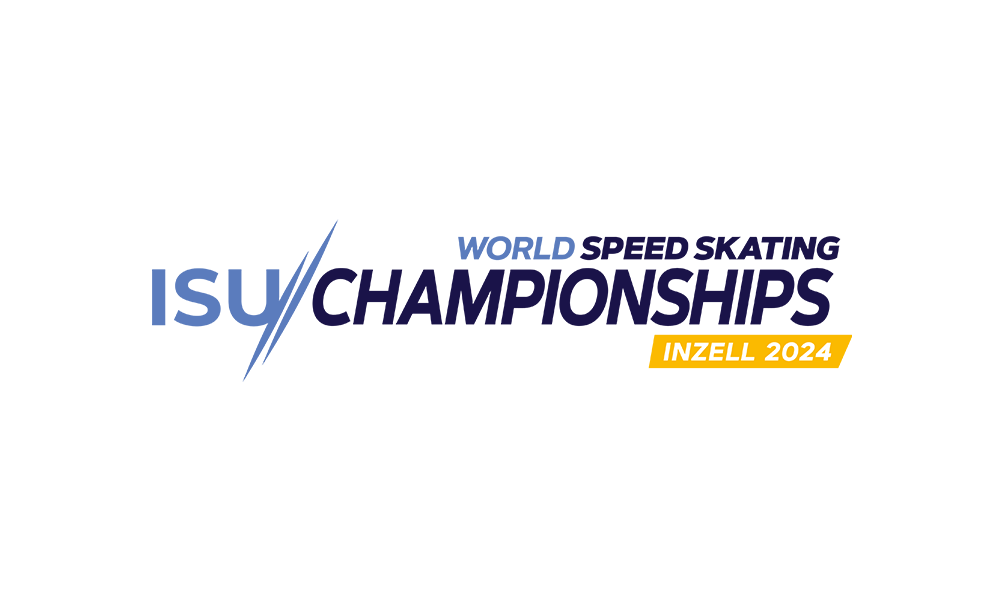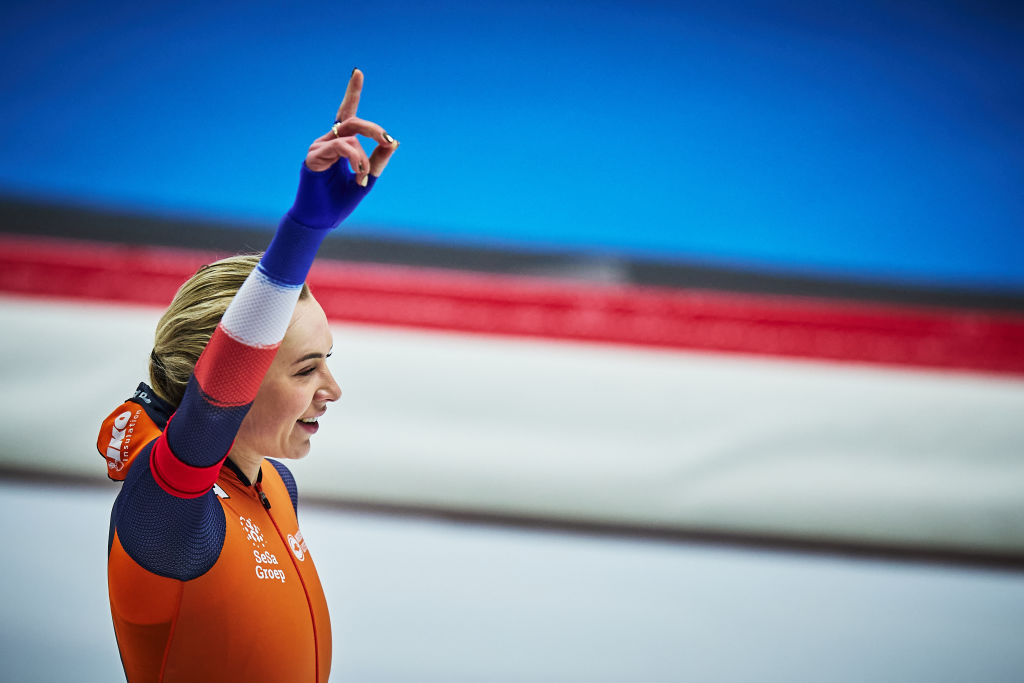
Joy Beune (NED) wins the Women's Allround 1500m at the ISU World Speed Skating Sprint Championships in Inzell, Germany © ISU
The 500m was her Achilles’ heel, butJoy Beune (NED) made up for it in the remaining three distances to win the title at her maiden ISU World Allround Championships. “I felt good this weekend, so the goal was winning three distances and I managed,” she concluded. Beune set two track records on her way to the title, leaving Marijke Groenewoud (NED) in second place. Behind Beune and Groenewoud, Antoinette Rijpma-de Jong (NED) seized her career fifth World Allround bronze medal.
Track record in 1500m
Groenewoud went into the second day of the tournament as leader in the ranking with a .48s gap over Beune, before the two title contenders faced each other in the 1500m on Sunday. Having been pushed into the favorite’s role by Groenewoud already, Beune took off on a mission. The bronze medalist from the World Single Distance Championships in Calgary last month, left Groenewoud behind in the first full lap to set a new track record in 1 minute and 52.65s, shaving .16s off the previous track best set by Dutch legend Ireen Wüst (NED) in 2019.
With her exploit of technique and speed, Beune grabbed the lead in the overall after three distances. Groenewoud finished in 1:54.06 and dropped to third place, with Han Mei (CHN) climbing to second with a 1500m silver in 1:52.97.
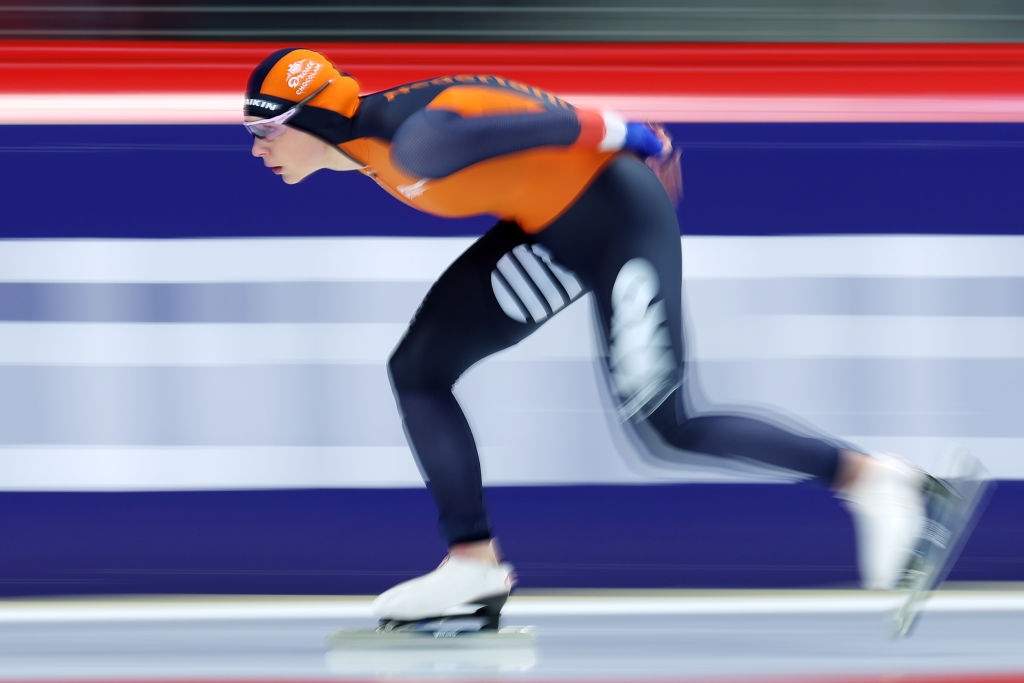 Joy Beune (NED) wins the Women's 5000m at the ISU World Speed Skating Sprint Championships in Inzell, Germany © ISU
Joy Beune (NED) wins the Women's 5000m at the ISU World Speed Skating Sprint Championships in Inzell, Germany © ISU
Groenewoud felt that losing time in the 1500m had been key to her defeat against Beune.
“My first day was good, but I lost it in the 1500m today. I had focused on opening fast, because that’s what I’m good at, but I didn’t succeed and then it becomes a struggle.
“You have to skate four good races to win an Allround tournament and I didn’t.”
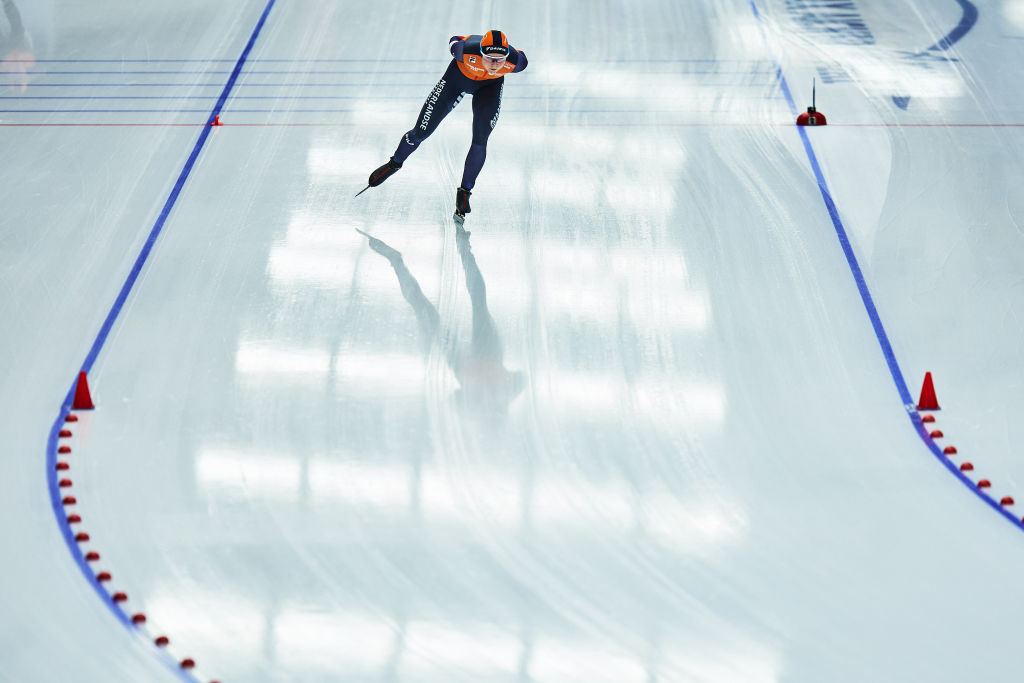
Marijke Groenewoud (NED) in the Women's Allround 1500m at the ISU World Speed Skating Sprint Championships in Inzell, Germany © ISU
Antoinette Rijpma-de Jong (NED) skated 1:53.45 to come third in the 1500m. Despite Han overtaking her, Rijpma-De Jong retained fourth place in the ranking, because the number three after two distances, Miho Takagi (JPN), had decided to pull out. In the final 5000m Rijpma-De Jong had to make up .15s on Groenewoud and .59s on Han to surpass them in the final ranking.
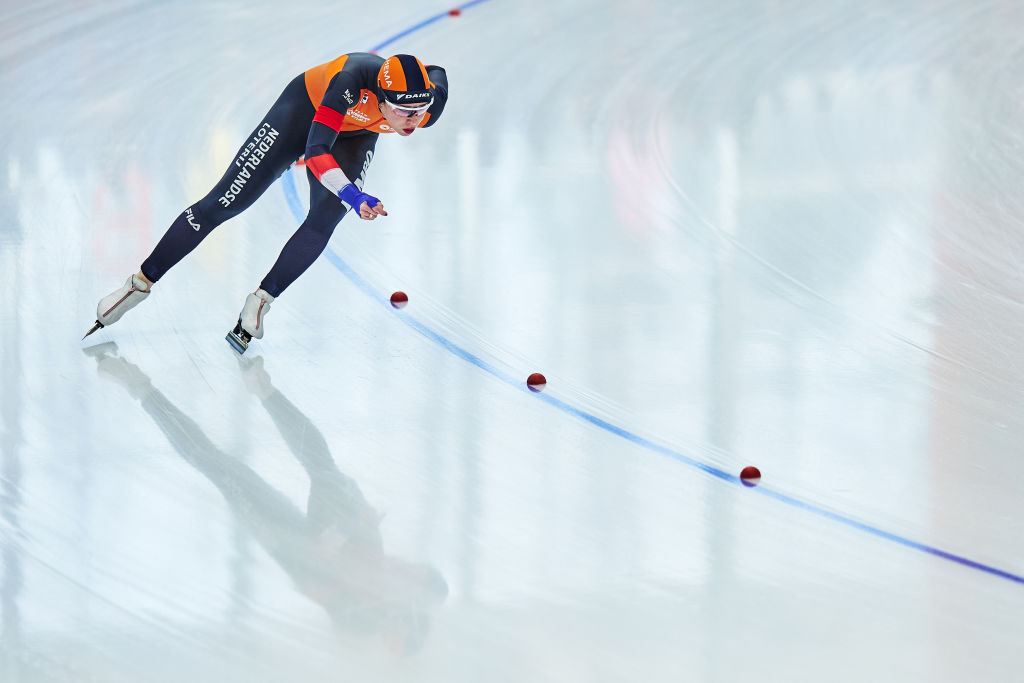
Antoinette Rijpma-De Jong (NED) in the Women's Allround 1500m at the ISU World Speed Skating Sprint Championships in Inzell, Germany © ISU
Beune struggles and survives
Entering the final distance, Beune had a 2.76s gap over second-ranked Han Mei, with Groenewoud at 3.10s in third place.
Groenewoud skated against Rijpma-de Jong in the second-last pairing of the 5000m, posting 6:54.04.
“I had to regroup mentally after the 1500m, she said. “And when I skated 6:54 I knew that it was not going to be enough for gold.”
Despite the blow she dealt Groenewoud in the 1500m and Groenewoud’s analysis, Beune had not been so sure.
“Marijke’s 6:54 was pretty fast, it certainly was not going to be a walk in the park for me.”
But Beune, the World 5000m Champion, managed to stay under Groenewoud’s lap-times throughout most of the race, eventually stopping the clock at 6:52.62 to take her third distance win of the tournament. Ragne Wiklund (NOR) placed second in the 5000m in 6:53.51, but the Norwegian had lost too much in the previous distances to have a shot at the podium. She ended up sixth in the overall.
Beune said she had struggled in the final distance.
“I really had to dig deep for this one,” she said. “I never really got into the race well and I just told myself to keep moving. I knew I had quite a gap so I just had to keep on fighting.”
Winning the Allround title at her debut in the event, meant a huge amount to Beune.
“That’s always been a dream, to be able to achieve it is very special.”
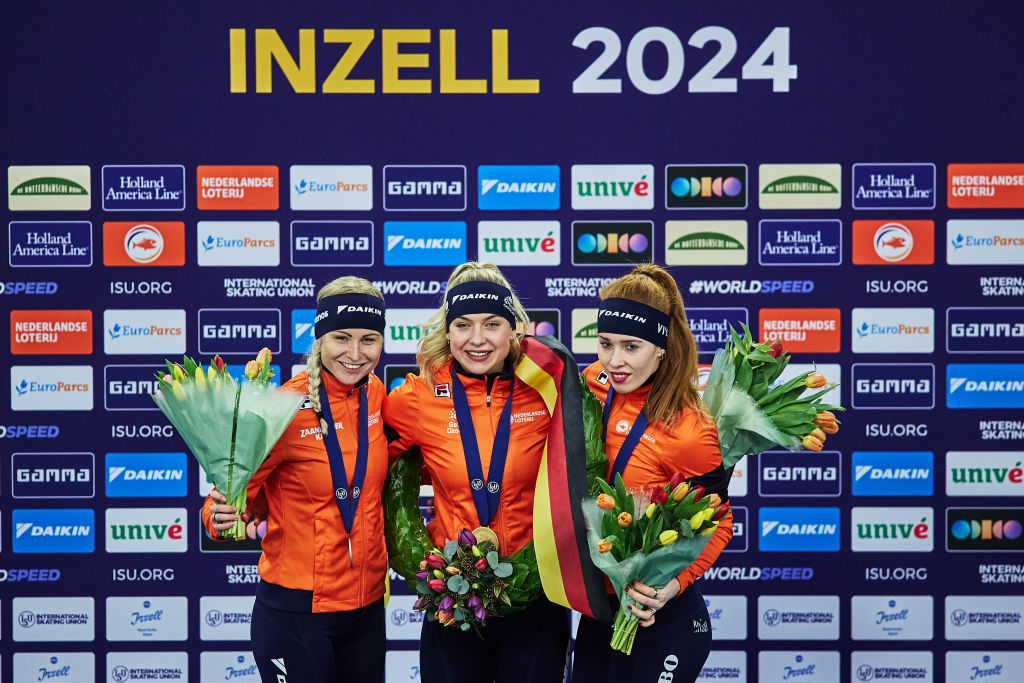
L-R: Marijke Groenewoud, Joy Beune and Antoinette Rijpma-De Jong (NED) winners of the Women's Allround in Inzell, Germany © ISU
Groenewoud also skated her first senior World Allround Championships.
“To come away with silver is not too bad after all,” she said. “I really like Allround speed skating and I feel that’s it really suits me well. I’d rather skate a World Allround Championships than a single distance one.”
Despite going into the final distance as number two in the overall, Han Mei eventually had to settle for fourth place. She couldn’t keep up with Beune in the final pairing of the 5000m. Her final time of 7:07.43 was not enough to keep either Groenewoud or Rijpma-De Jong at bay.
For Rijpma-De Jong, who finished the 5000m fifth in 6:58.78, coming third in the overall meant her career fifth World Allround bronze.
“Again bronze,” she sighed in disappointment. “I had a difficult tournament. In training it was OK, but at the moment my technique is a little off and then it becomes a struggle. Yesterday my start in the 3000m was not good enough and today I tried to attack in the 1500m, but the speed didn’t come easy.”
Rijpma-De Jong has shifted her attention more to the shorter distances. She said:
“The Allround is still very important to me, I think it’s one of the most beautiful things there is, and it’s still on my bucket list, but it’s getting more difficult over time. With the (Olympic) Games and the focus on single distances… Going just for the 1000m and the 1500m or also training for the 3000m? Those are difficult choices to make and I haven’t decided yet.”
Speed Skating tradition
Although the single distance format tends to get more attention because it’s Olympic style, the long track Speed Skating championships were traditionally decided by racing multiple distance tournaments. The first ISU World Allround Speed Skating Championships were held in 1893, when Jaap Eden (NED) took the title in Amsterdam (NED). The first World Single Distances Championships were held over a century later in Hamar (NOR) in 1996.
In the traditional Allround format skaters a classification is made up after four distances. Men skate the 500m and the 5000m on the first day and the 1500m and the 10,000m on the second. The women’s distances are 500m, 3000m, 1500m and 5000m.
The World Sprint Championships were first held in 1970. In this format both the men and the women skate the 500m and the 1000m twice.
In Inzell (GER), the Sprint Championships are held on Thursday and Friday, and the Allround Championships are scheduled for Saturday and Sunday.
Samalog score
In both the Sprint and the Allround tournaments the final ranking is based on the so-called samalog score over four distances. The samalog system converts times into points, with the 500m as starting point. For a 500m race, the number of seconds counts as the number of points. For the 1000m the number of seconds is divided by two to calculate the number of points; for the 1500m it’s divided by three, for the 3000m by six, for the 5000m by 10 and for the 10,000m by 20.
Program:
Thursday 7 March 2024
19:00 - 1st 500m Women
19:00 - 1st 500m Men
19:00 - 1st 1000m Women
19:00 - 1st 1000m Men
Friday 8 March 2024
18:30 - 2nd 500m Women
18:30 - 2nd 500m Men
18:30 - 2nd 1000m Women
18:30 - 2nd 1000m Men
Saturday 9 March 2024
12:45 - 500m Women
12:45 - 500m Men
12:45 - 3000m Women
12:45 - 5000m Men
Sunday 10 March 2024
13:15 - 1500m Women
13:15 - 1500m Men
13:15 - 5000m Women
13:15 - 10000m Men
